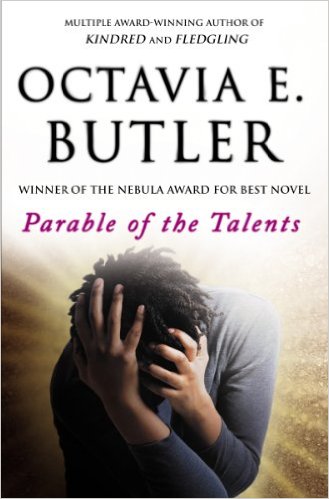Tuesday
My novelist friend Rachel Kranz alerted me to this Huffington Post article about science fiction novelist Octavia Butler all but predicting, in 1998, the rise of Donald Trump.
An African American author raised in poverty, Butler is noted for her depictions of a dystopian future. In The Parable of the Seed, scarcity is tearing apart the United States. In the sequel, The Parable of the Talents, there is a religious-political leader—he’s the head of the “Christian America Church”–who promises to “make America great again.” (Yes, you heard that right.) When Evangelical white supremacist groups commit acts of terror and murder, he only mildly criticizes them. After all, there wouldn’t be unrest if everyone became a Christian and joined his party. Here’s the narrator reflecting upon a recent massacre:
I couldn’t help wondering, though, whether these people, with their crosses, had some connection with my current least favorite presidential candidate, Texas Senator Andrew Steele Jarret. It sounds like the sort of thing his people might do—a revival of something nasty out of the past. Did the Ku Klux Klan wear crosses—as well as burn them? The Nazis wore the swastika, which is a kind of cross, but I don’t think they wore it on their chests. There were crosses all over the place during the Inquisition and before that, during the Crusades. So now we have another group that uses crosses and slaughters people.
Trump has received a number of endorsements from white supremacists, including David Duke, and he regularly retweets white supremacist messages. In one case, he borrowed, and then defended using, a white supremacist image of a star of David surrounded by money. The antiSemitic association of Jews with big money was used to label Clinton as “the most corrupt candidate ever.”
Like Trump, Jarret longs for a time when whites and Christians reigned supreme:
Jarret’s people could be behind it. Jarret insists on being a throwback to some earlier, “simpler” time. Now does not suit him. Religious tolerance does not suit him. The current state of the country does not suit him. He wants to take us all back to some magical time when everyone believed in the same God, worshipped him in the same way, and understood that their safety in the universe depended on completing the same religious rituals and stomping anyone who was different There was never such a time in this country.
Many of Jarret’s supporters, like Trump’s, are fact resistant and therefore particularly susceptible to emotional manipulation:
But these days when more than half the people in the country can’t read at all, history is just one more vast unknown to them. Jarret supporters have been known, now and then, to form mobs and burn people at the stake for being witches. Witches! In 2032! A witch, in their view, tends to be a Moslem, a Jew, a Hindu, a Buddhist, or, in some parts of the country, a Mormon, a Jehovah’s Witness, or even a Catholic. A witch may also be an atheist, a “cultist,” or a well-to-do eccentric. Well-to-do eccentrics often have no protectors or much that’s worth stealing. And “cultist” is a great catchall term for anyone who fits into no other large category, and yet doesn’t quite match Jarret’s version of Christianity. Jarret’s people have been known to beat or drive out Unitarians, for goodness’ sake. Jarret condemns the burnings, but does so in such mild language that his people are free to hear what they want to hear. As for the beatings, the tarring and feathering, and the destruction of “heathen houses of devil-worship,” he has a simple answer: “Join us! Our doors are open to every nationality, every race! Leave your sinful past behind, and become one of us. Help us to make America great again.” He’s had notable success with this carrot-and-stick approach. Join us and thrive, or whatever happens to you as a result of your own sinful stubbornness is your problem.
A version of what Butler’s narrator says about Jarret’s opponent could also have been said about a number of Trump’s GOP opponents. Some (although not me) also say it about Hillary Clinton:
His opponent Vice President Edward Jay Smith calls him a demagogue, a rabble-rouser, and a hypocrite. Smith is right, of course, but Smith is such a tired, gray shadow of a man. Jarret, on the other hand, is a big, handsome, black-haired man with deep, clear blue eyes that seduce people and hold them. He has a voice that’s a whole-body experience, the way my father’s was. In fact, I’m sorry to say, Jarret was once a Baptist minister like my father. But he left the Baptists behind years ago to begin his own “Christian America” denomination. He no longer preaches regular CA sermons at CA churches or on the nets, but he’s still recognized as head of the church.
In accounting for Jarret’s appel, the narrator helps us understand why it doesn’t matter if Trump contradicts himself from one moment to the next regarding policy:
It seems inevitable that people who can’t read are going to lean more toward judging candidates on the way they look and sound than on what they claim they stand for. Even people who can read and are educated are apt to pay more attention to good looks and seductive lies than they should. And no doubt the new picture ballots on the nets will give Jarret an even greater advantage.
Good novelists know the society they are writing about. Butler’s African American perspective bolsters her insights. The dystopia that she predicts for 2032 may occur even sooner if we elect Trump as our president.
